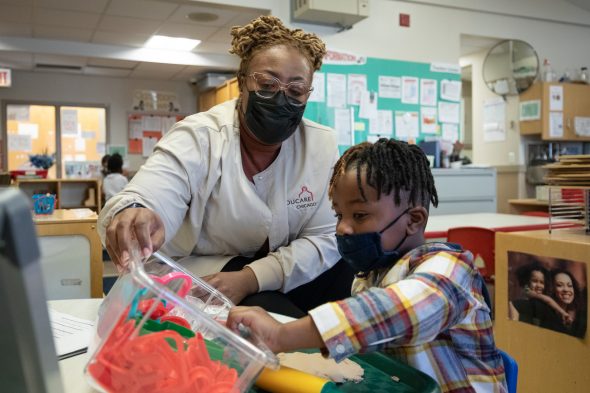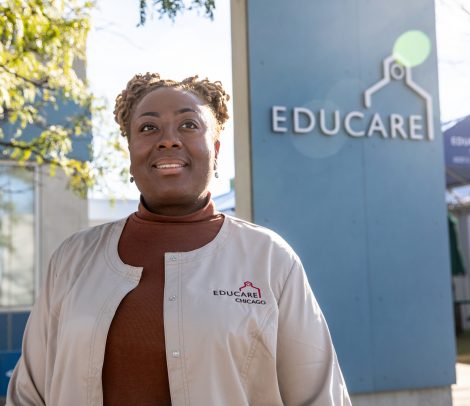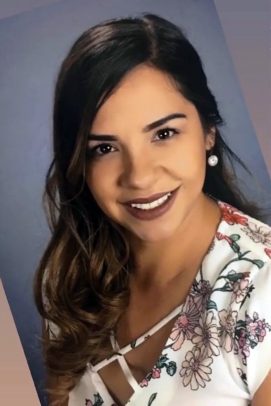Investing in teachers who shape young minds
As the senior master teacher at Educare Chicago, an early childhood program on the South Side operated by Start Early, Danielle Jordan knows firsthand the challenges that teachers and their young students have had to endure during the COVID-19 pandemic.
Like most schools across the country, the constantly changing pandemic has forced the year-round school in the Grand Boulevard neighborhood to adapt as it struggled to provide the best education for its students in the Early/Head Start program serving children from 6 weeks to 5 years old.
As a mentor instructor to eight teachers at the school, Jordan is responsible for supervising and facilitating the learning for 17 students in each of its five classrooms and was responsible for helping teachers adapt to virtual teaching.
But even though she had worked in the field of education for the last 20 years and had the proper state credentials that allowed her to teach in a Head Start program, like many Illinois early childhood teachers, she lacked an Illinois Professional Educator License. To remedy this, she discovered the alternative licensure program, a free program offered by the University of Illinois Chicago that would give her and her fellow teachers a route toward licensure and a master’s degree in early childhood education.
“All of us were master-level holders in child development but who hadn’t obtained licensure,” Jordan said. “With this program, you are completing graduate-level courses that can be counted toward a master’s. You complete the necessary coursework that is needed to obtain the professional teacher license for the state of Illinois.”
The UIC Early Childhood Education Alternative Licensure Program is funded by a Department of Education teacher quality partnership grant that makes up part of the $14 million in research money the UIC College of Education has received from donors, foundation awards, and state and federal funding. The money includes funds for projects that began in the current fiscal year as well as existing programs.
Leading the initiative are Catherine Main, senior lecturer and program coordinator in the College of Education; Kate Zinsser, associate professor of community and prevention research in the psychology department in the College of Liberal Arts and Sciences; and Natalie Vesga, director of the Chicago Early Childhood Preparation and Pathway Project. The pandemic required them to adapt the program to meet the virtual requirements of their students, who are teachers themselves.
Currently, 107 students are in the program, each working with about 20 preschool-age children in more than 80 community-based organizations in neighborhoods that have been disproportionately impacted by the pandemic. The grants allow them to maintain cameras in the classrooms so UIC instructors can observe the in-person classes and provide real-time and real-life coaching to the teachers as they work to receive their credentials and master’s degrees.
“We pivoted our coaching model to respond to what was happening during COVID,” Main said.
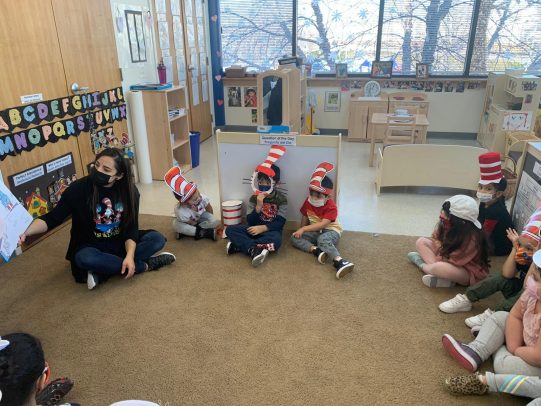
In addition, Zinsser said, “These teachers are participating in a fairly robust program evaluation where they are being observed and completing surveys nine times over the course of the program to track their progress and experiences.”
The bulk of the grants are related to this residency program, which improves their teaching as well as bolsters their salaries through the attainment of their advanced credentials, Zinsser said.
“Teachers in the program receive significant educational support and coaching. When they complete their professional license, they are eligible for higher compensation,” Zinsser said. “This is a workforce that is horrifically underpaid and exasperated and at the end of their ropes. These supports and recognition of their value and professionalism are very meaningful.”
Jordan said the coaching and mentoring she receives are especially rewarding because as a mentor teacher herself, she can draw from her own experiences.
“That’s one thing that I really did like about the UIC program — the fact that they are teacher’s teachers,” said Jordan, adding that several other teachers in her school have also become involved in the UIC program.
Lizully Pedroza, a lead teacher at El Valor Carlos Cantu in the Little Village neighborhood, said the UIC program is helping her earn her state professional educator license and her master’s degree. Pedroza said she also had to adapt as the Head Start preschool moved virtually before returning to in-person classes in the summer of 2020.
Like Jordan, Pedroza has noticed the toll the pandemic has had on the school’s youngsters, who are often the children of financially disadvantaged frontline workers.
“I have noticed that children have been affected in different ways, which also affects the way we teach them,” Pedroza said. “Now we have to focus on socio-emotional aspects to support children.”
Pedroza, who has been at the Head Start preschool for six years, said being in the program has given her more tools to help her students and their families. The virtual aspect of the program has been a benefit because it has allowed her to take classes as she continues working.
“As a teacher, I am better prepared academically to advocate for my students and their families,” Pedroza said.
The grants have also helped fund the creation of an online kindergarten readiness website for teachers and families, as well as continued to fund the Early Math Counts and Early Science Matters websites, said Kathleen Sheridan, UIC associate professor and chair of the educational psychology department.
The free websites provide professional development in STEM education, which research has shown has a positive impact on teachers, Sheridan said. Thousands of teachers across the country have taken advantage of the classes to fulfill professional development requirements, Sheridan. said
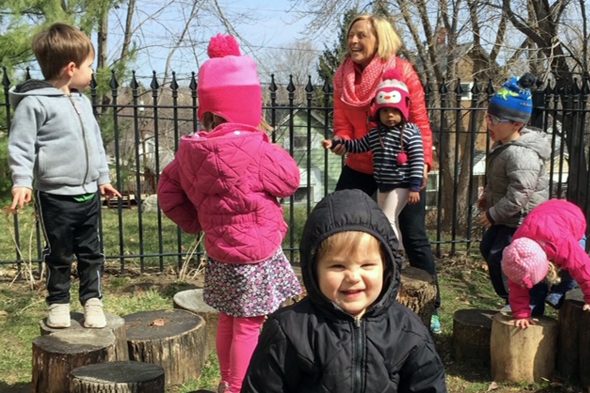
One of those people is Diann Gano, an early childhood educator who runs Under the Gingko Tree, a nature-based program in Rock Island. She has been a licensed family child care provider for more than 30 years. The work offered on the sites gives her the professional development required to keep her credentials up to date, she said.
“Honestly, the UIC Early Math Counts and Early Science Matters courses are the best I have taken. It’s hard to find a great website that doesn’t dumb you down or is not user-friendly,” Gano said. “The courses are quick, informative and give me confidence in my teaching.”
Jordan said the research dollars that UIC has invested in the program, as well as the overall research in educators of young learners, is one of the greatest investments that can be made.
“We have to invest in teachers,” Jordan said. “The first five years lay a foundation as to how they (children) are going to be throughout their lives. Why not honor that work?”
Categories
